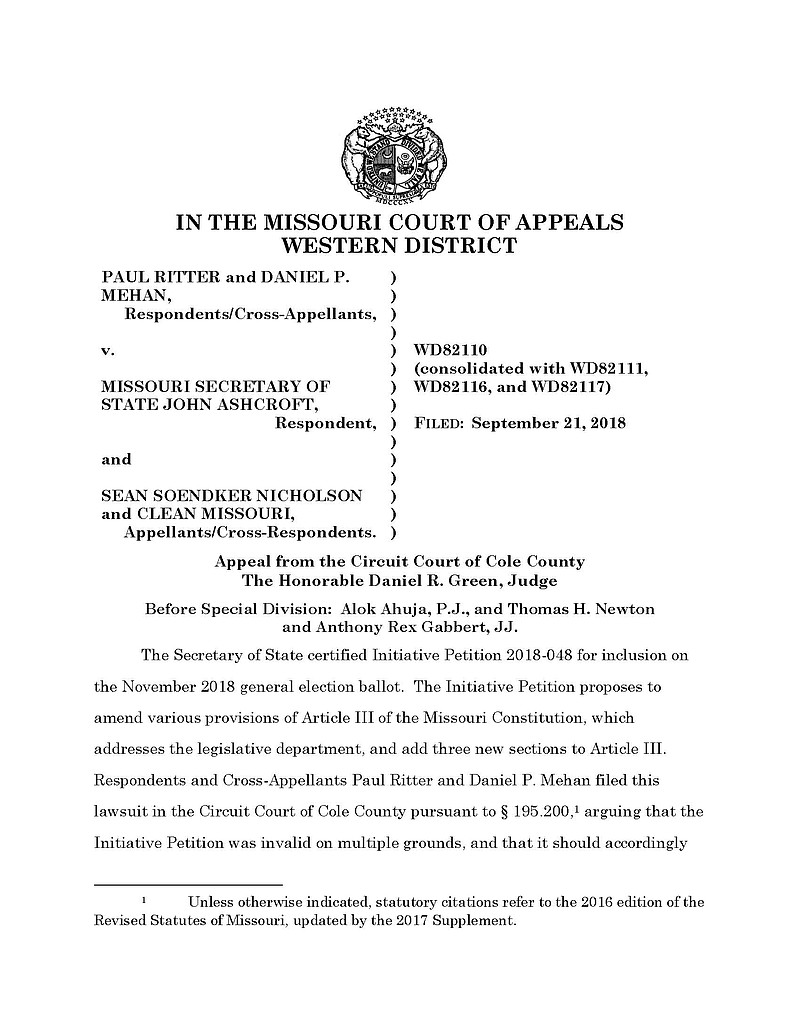Missourians will get to vote on the proposed "Clean Missouri" amendment to the state Constitution, a three-judge panel of the Missouri appeals court ruled Friday.
But one of the amendment's opponents promised an immediate appeal to the state Supreme Court.
"Clean Missouri" is the proposal to make a number of constitutional changes affecting the Legislature and its operations.
When Secretary of State Jay Ashcroft certified it for the Nov. 6 election ballot, he designated it as Amendment 1.
As explained in the appeals court's 34-page ruling, the amendment, if approved by voters, would:
Require legislators and employees of the General Assembly to wait two years after the conclusion of the legislative session in which they last worked before they could serve as paid lobbyists.
Prohibit legislators and legislative employees from accepting gifts valued at more than $5 from paid lobbyists.
Prohibit candidates for the Senate from accepting campaign contributions of more than $2,500 (per person) in any one election cycle and prohibit House candidates from accepting contributions of more than $2,000.
Prohibit candidates from accepting contributions from any federal political action committee unless the committee has filed the same financial disclosure reports as Missouri PACs.
Declare that legislative records are public records and legislative proceedings are public meetings, subject to generally applicable public access laws including the "Sunshine Law."
Prohibit legislators and legislative candidates from engaging in political fundraising activities on state property.
Modify the procedure for apportioning state House and Senate districts following each federal census, which is done every 10 years as required by the U.S. Constitution.
In its Friday afternoon ruling, the appeals court in Kansas City reversed Cole County Circuit Judge Dan Green's Sept. 14 decision blocking the proposal.
In a 13-page ruling, Green had said: "All matters included in the Proponents' Petition do not relate to - and are not properly connected with - any readily identifiable and reasonably narrow central purpose. Instead the twenty or so substantive changes outlined in the Petition relate to at least two different and extremely broad purposes: (1) the organization of the General Assembly; and (2) ethics or campaign finance regulation aimed at avoiding misconduct by public officials in multiple branches and levels of government."
But Judge Alok Ahuja, writing for the appeals court, said: "We conclude that the Petition's multiple provisions all relate to a single central purpose: regulating the legislature to limit the influence of partisan or other special interests. In rejecting (the) "single subject" challenge, it is significant that all of the constitutional amendments proposed in the Initiative Petition properly fall within the scope of Article III of the Missouri Constitution."
Article III covers the Legislature and its procedures.
Supporters of the Clean Missouri proposal always have argued their plan addresses only the Legislature, its organization and operations.
Ahuja wrote: "Indeed, all of the proposed amendments relate to matters contained in the first 20 sections of Article III - which address the establishment of legislative districts, legislator qualifications, legislative elections, and disqualification of legislators from holding certain other offices."
Two lawsuits were filed challenging Ashcroft's decision to put the proposal on the Nov. 6 ballot - one with Paul Ritter, of St. Elizabeth, as the plaintiff, and the other with Dan Mehan, president and CEO of the Missouri Chamber of Commerce and Industry, as the plaintiff.
Both raised five, similar issues - and they were consolidated at both the trial and appeals courts.
The proposal is backed and being promoted by a group called "Clean Missouri," which said in a Friday afternoon news release about the court's ruling: "The lobbyists lost, and the people won. The court of appeals just rejected the desperate attempt by a small cadre of Jefferson City lobbyists to keep Amendment 1 off the ballot."
But Mehan, in his own release from the state Chamber of Commerce, said he was disappointed with the decision, "which makes it more likely Missouri voters will have to decide a deceptive, poorly drafted amendment (that) also lowers the bar for the process we use to alter our state constitution. It opens the door to future misuse of the initiative petition process by out-of-state activists trying to meddle with the most essential rules that govern our state.
"While little time remains, we will ask the Missouri Supreme Court to consider our case and make a final decision. If Amendment 1 does end up on the ballot, we will work alongside the growing coalition of opponents to educate Missouri voters about how this activist effort could lead to a radical shift in priorities in the Missouri General Assembly, bringing higher taxes and more bureaucratic regulation."
As noted by the appeals court, both Ritter's and Mehan's lawsuits argued the Clean Missouri petition:
Contains more than one subject, in violation of the Missouri Constitution.
Amends multiple articles of the Constitution.
Failed to set forth properly the text of the proposed measure, and of the constitutional provisions being amended or repealed.
Failed to identify all provisions of the Constitution that would be amended or repealed, if approved by voters.
Green's Sept. 14 ruling agreed with two of those points, and he ordered Ashcroft to rescind his certification and remove the proposal from the ballot.
The appeals court temporarily blocked Green's order Tuesday, until it could hear the oral arguments Thursday afternoon.
Friday's ruling permanently blocks it, leaving the proposal on the ballot as Amendment 1.
"The Secretary of State correctly declared that the Initiative Petition was sufficient, and correctly directed that the Petition appear on the November 2018 general election ballot," the appeals court said.

